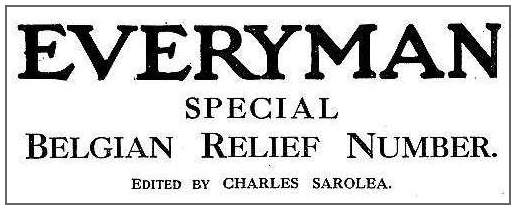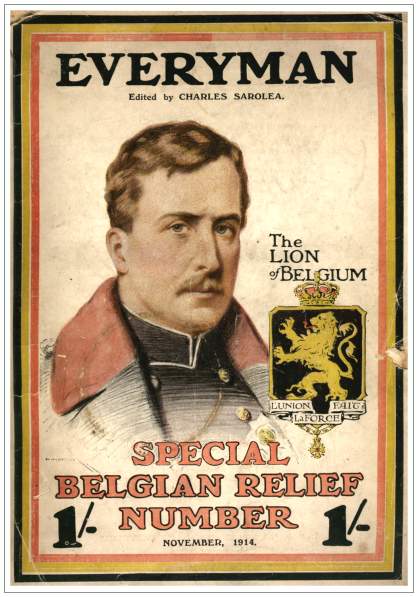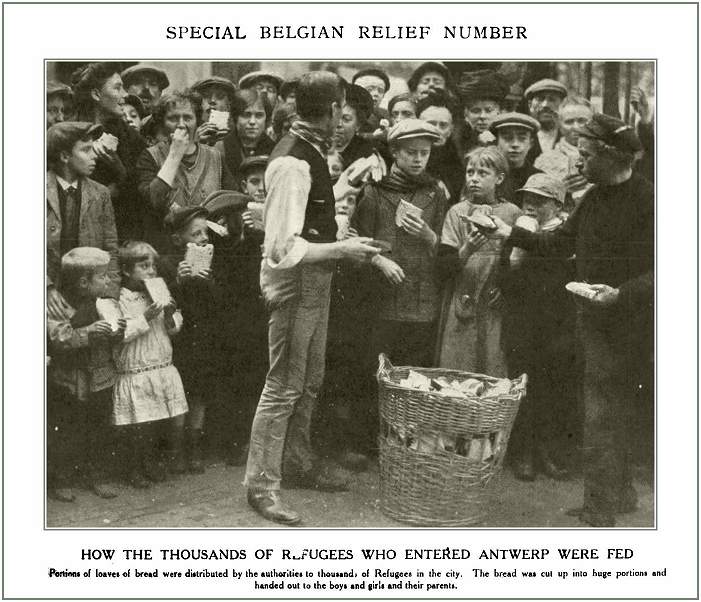


______________________________________________________________
from 'Everyman' Special Belgian Relief Number November 1914
RAVAGED BELGIUM
A NATION IN A STATE OF FAMINE
UNEXAMPLED MISERY
by MR. J. H.Whitehouse M.P.

I visited Belgium with the object of ascertaining the present condition and needs of the civilian population in the districts occupied by the German army, since only a comparatively small number of refugees are reaching these shores.
Having always regarded war as the negation of all that is good, I desired to see what its ravages were to a country exposed to all its fury, and what steps were possible to mitigate them.
I was received by the members of the Belgian Cabinet with the utmost courtesy. They gave me every possible facility for seeing their country, and their anxiety throughout was that I should have as full knowledge as possible of the conditions in order to give here an accurate report. I do not think anyone here has realized the plight of the civilian population in Belgium to-day, and I can only attempt to give any picture of this by describing some of my own experience.
On the morning of September 26th I was informed that it would be possible for me to be taken as far as Termonde, and we started at midday in two military cars attended by a staff officer and others. We left Antwerp by a temporary bridge across the Scheldt to the south-west of the city.
I was enabled to estimate something of the damage which the Belgians had had to inflict upon themselves in order to supplement the defenses of their city. Hundreds of thousands of trees had been cut down. The trunks had all been removed so as to afford no cover to the enemy; houses had been blown up or otherwise destroyed and later we passed through country which had been flooded as a further measure of defense.
The damage of these precautionary measures alone amounted to about £10,000,000.
When at length we reached the Scheldt before Termonde we found a very rough, narrow bridge, which with care we were able to cross. Here the firing was very vivid. There were considerable numbers of Belgian troops, and I saw many evidences of the battle which was then raging.
We came to the margin of the town and began our detailed inspection.
Termonde a few weeks ago was a beautiful city of about 16,000 inhabitants. I found it entirely destroyed. I went through street after street, square after square, and I found that every house was entirely destroyed with all its contents.
Of the population I thought not a soul remained. I was wrong. For as we turned into a square, where the wreck of what had been one of the most beautiful of Gothic churches met my eyes, a blind woman and her daughter groped among the ruins. They were the sole living creatures in the whole town. Shops, factories, churches, the houses of the wealthy, all were similarly destroyed. One qualification have I to make of this statement. Two, or perhaps three, houses bore a German command in chalk that they were not to be burnt. These remained standing but deserted amid the ruins on either side. Where a destroyed house had obviously contained articles of value looting had taken place.
I inquired what had become of the population. It was a question to which no direct reply could be given. They had fled in all directions. Some had reached Antwerp, but a great number were wandering about the country panic-stricken and starving. Many were already dead. We went forward as far as the Belgian trenches, and I was enabled to see something of the active operations.
I had other opportunities of seeing that what had happened at Termonde was similar to what had happened in other parts of Belgium under the military occupation of Germany, and I have given this record of the condition of Termonde because it is typical of so many other parts of Belgium.
The result is that conditions have been set up for the civilian population throughout the occupied territory of unexampled misery. Comparatively only a few refugees have reached this country. The others remain wandering about Belgium, flocking into other towns and villages, or flying to points a little way across the Dutch frontier.
The whole life of the nation has been arrested. The food supplies which would ordinarily reach the civilian population are being taken by the German troops for their own support, the peasants and poor are without the necessaries of life, and the condition of starvation grows more acute every day. Even where, as in some cases happens, there is a supply of wheat available the peasants are not allowed to use their windmills owing to the German fear that they will send signals to the Belgian army.
We are therefore face to face with a fact which has rarely, if ever, occurred in the history of the world - an entire nation in a state of famine and that within half a day's journey of our own shores.
To the conditions of famine and homelessness which exist on such a stupendous scale there must be added one equally bad - the mental panic in which many of the survivors remain. I understood how inevitable this was when I saw and heard what they had passed through.
Eye-witnesses of unimpeachable character described to me the sufferings of the women and children at Liege. They fled from their burning houses clinging to husbands and fathers. They were violently pulled from them and saw them shot a few yards from them.
Reproduced by permission from "The Daily Mail."